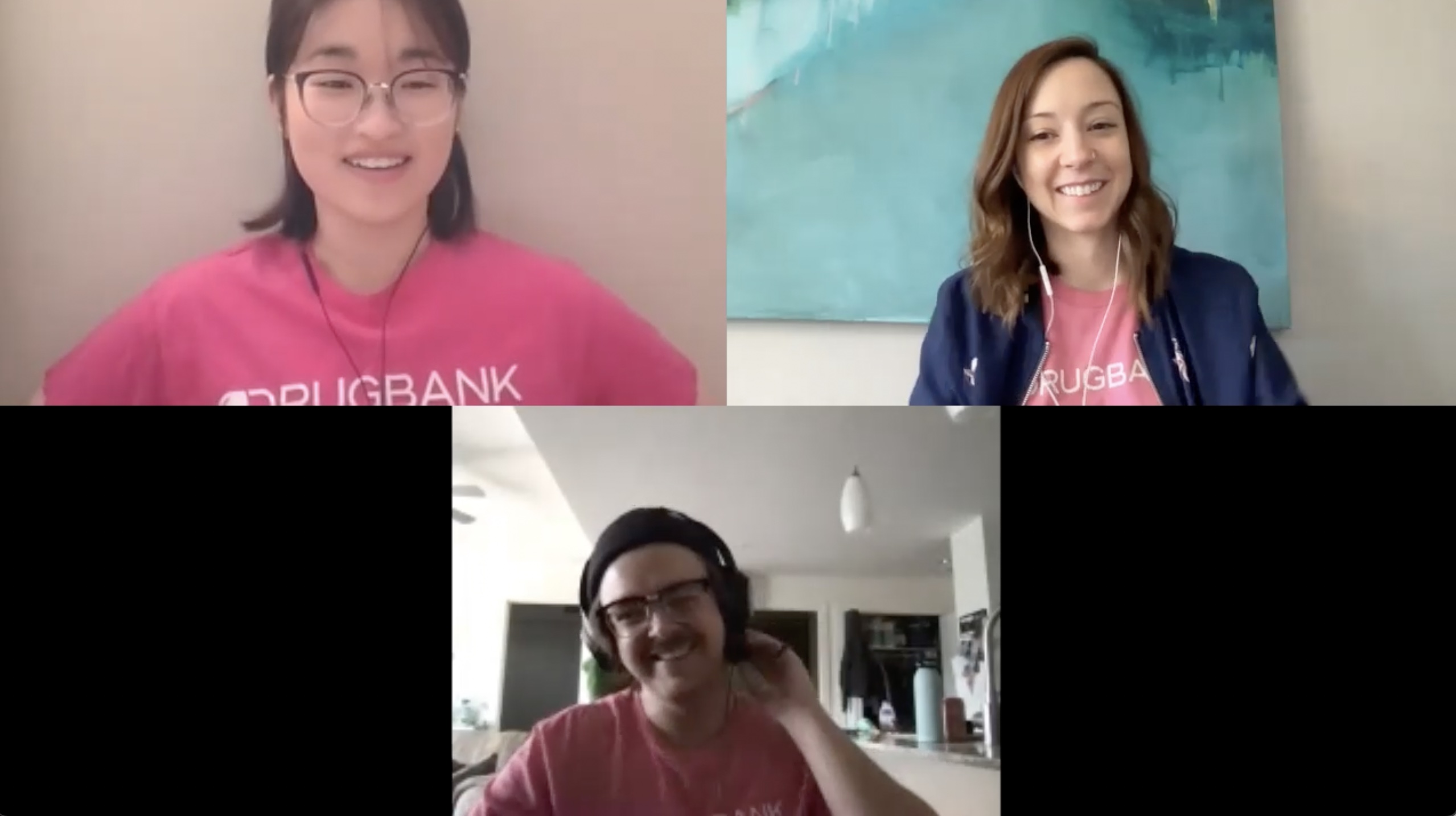All tech companies have software developers, sales folks, and other common roles, but what happens when a tech company posts for a Biocurator? Here at DrugBank, our team of Biocurators are the heart of our company. They're the folks who make sure we have the data that powers our knowledge core, products, and ultimately our customers' solutions.
So what exactly is a Biocurator and how do you know if you're qualified to apply? Our Manager of People & Culture, Shay, sat down with Lucy Chin and Jordan Cox from our Biocuration team to help answer some questions.
Tell me a bit about yourselves.
Jordan: I’ve been with Drugbank for 1.5 years in the Biocurator position, and in terms of what I like to do for fun, is mostly play video games and listen to music - you know, just generally nerdy things.
Lucy: I like to watch movies and relax, and my new hobby for the pandemic is eating and ordering takeout food. I have been with DrugBank for 3 or 4 years now.
Where'd you go do to post-secondary and what did you take?
Lucy: I got my BSc in Pharmacology at the University of Alberta. I joined DrugBank during my fourth year as a summer student and then decided to stay on full-time before returning to school the following year to finish my degree.
Jordan: I did two years at my local college in Medicine Hat and then I finished my Biological Sciences degree with two more years at U of A. I graduated with a BSc in Bio with a Minor in Film Studies (which is weird), and then I did a Pharmacy Degree after that, so I got my PharmD in 2018.
Did you think you’d join a tech startup when you entered post-secondary?
Jordan: I had no intentions of going into any type of tech role, and it's not necessarily because I wasn’t interested. Tech and computers were always a hobby for me. I wanted to find a role that could marry both my science background and love of technology, but I didn’t think there was a possibility to do that. When I was in Pharmacy school, I started as a clinical pharmacist and carried on with that role for a couple of years before I saw the DrugBank position.
Lucy: Ya, I’m with Jordan on this one. I didn’t think I would join a tech startup when I first started my undergrad. My understanding of what type of career field I was going to get into was quite narrow because I couldn't imagine myself in a setting that was not in a lab or a hospital or a research setting. I imagined I would do some sort of research, go into a Master’s Degree, or work in a lab. I think this happened because not a lot of students are exposed to what opportunities there are outside of conventional work settings like the lab or research. But now, there are a lot of companies that reach out to students, like DrugBank, and I think that it’s really good students are getting exposed to these opportunities and learning that ya, there are a lot of job opportunities out there where you can work in an unconventional work setting with the science background you have.

Why’d you join our team and where did you come from?
Lucy: I kind of landed on DrugBank by coincidence. I literally saw a job posting on a flyer when I was walking home from a class, so I think I’m lucky in that way.
Jordan: A flyer?! That was a long time ago. DrugBank seemed like the solution to the quandary I found myself in during the last couple of years in Pharmacy school. There are stats that say something like 90% of PharmD graduates go to work in a retail or hospital setting, which astounded me. I told my wife I was setting my sights on the “other” 10%, but I didn't really know what that was or whether it even really existed. As it turns out it does exist, and it's Biocuration. So ya, it seemed like a really cool way to leverage the education I had in a very unique way.
Lucy: Ya further to what I mentioned, I joined DrugBank because it was cool, different, and exciting from what I imagined myself doing after I graduated. I was pretty fixated on doing research, and I tried a year doing scientific research in a lab during my final year, and I didn’t like it so wasn’t really sure what I wanted to do with my life, and that’s when I found the flyer! And I thought ok this is cool and interesting and new and something I didn’t think about before. It was cool to be able to apply my knowledge and understanding of pharmacology to work that's involving AI and ML and data improvement. I thought I would take the risk and challenge myself, the people looked really cool and fun and nice, and I thought why not, just give it a try!
What did you think a biocurator was when you first started? Were your assumptions correct?
Jordan: I didn’t have a clue what a biocurator was when I applied. You sort of get a gist of it from the application and job description. To me, it sounded like I would get paid to write about drugs, basically. Like I said before, I graduated with a minor in film studies and really enjoyed writing, especially long-form essays on interesting topics (like movies), so the opportunity to do the same thing, but with drugs - another topic I am interested in - just seemed like a win-win to me. I guess I was kind of correct, I definitely do a lot of writing, but there’s a lot more to it.
Lucy: I had a similar understanding to Jordan. When we first start, it’s like basic curation tasks and techniques. We read a lot then try to recreate that information into a more structured, curated, readable, digestible way for the audience. That was my basic understanding - you take the basic info and make sure it's accurate and valid. But honestly, that’s just the tip of the iceberg of what curation involves. We have so much data and sometimes we create data sets that haven’t been created before, and sometimes we train machines - that’s not something I thought I would ever be doing - so the machines can help us do our job in a smarter and more efficient way. One of the awesome things is seeing how computers and human power can work together and do these crazy things and that’s really exciting to witness. There are so many possibilities with biocuration.
What is the day-to-day of a biocurator?
Jordan: I had a really hard time coming up with an answer for this. I think, very broadly, it revolves around updating and maintaining data around drugs. Sometimes it involves writing - like drug label info and clinical trial data - and making it more readable. On the other side, we create data that machines can read easily. We’re the content experts on the team, so any questions that come up from other team members or customers - or if we need to contribute to things like our COVID-19 dashboard - that’s where we come in.
Lucy: I think Jordan summarized it quite well. Those are definitely all the things we do. We sometimes have side projects - small and large - and we help to answer questions for whoever needs those answered. Everything we do, it's about improving our data so what we present is accurate, up-to-date, reliable, and valid. The cool thing about curation is that we do a lot of things, and our day-to-day always looks different.
Jordan: Ya! That’s why it’s so hard to describe. Your day is different every day!
Lucy talked about those side projects, and I want to go into detail about that. We just released new data the biocuration team developed, from seven new geographic regions. Tell me about the challenges associated with trying to compile data from those regions?
Jordan: I liked it! It was fun; it was challenging. We were essentially doing the same job we were doing before, just in a language none of us spoke. It was a unique challenge, and trying to reconcile other countries and jurisdictions who organize their drug data differently - it wasn’t just the language piece but also they don’t necessarily have like an “FDA equivalent” so we were confined within their systems - that was a fun challenge, and the result is great.
Lucy: Ya I enjoyed it as well! Google translate is very entertaining to work with - it’s so helpful and so not helpful at the same time - but we had a lot of fun with it, and it reminded us that we can’t rely on a single source to get appropriate information all the time.
Yes! This is one of the many things that I think folks looking in from the outside of our company don’t understand about how we function, and about your role. So why would you say the role of biocuration is important to our team?
Jordan: I have a great little analogy. I was actually talking to my mom about this interview, and she told me that I should describe biocuration the same way I described it to her. That it’s like the same thing as a museum curator, but instead, we do it with drug data and we curate our “drug museum.” We are the gatekeepers to the data in DrugBank and we are responsible for making sure it's accurate and all there.
Lucy: That’s a good analogy! Another analogy is that we are the brains behind machines. I think that sums it up because knowledge translation, data extraction, and improvement all require the human brain in some sort of way.
Jordan: Ya, that’s something I didn’t even consider. You know, computers are very helpful, and machine learning is very helpful, but it’s not infallible, so we are there as a second line of defense to make sure the machines aren't…
Lucy: ….going off the rails?
Jordan: Yes. Exactly.
What sorts of skills would you say are crucial to being a biocurator? What are the best educational backgrounds for the role?
Jordan: In my mind, the most crucial set of skills is the ability to think critically and know how to research well, including how to check your research against other sources. A background in pharmacy, or pharmacology or medicine is helpful, but I think a lot of scientific disciplines teach people how to research and evaluate sources, so if you can do that you’ll likely succeed as a biocurator. In the end, it doesn’t matter what type of data you’re used to working with, so long as you understand how to critically think about data and research, and discern what you can and cannot trust.
So of course, the context of understanding drug data is helpful, but I don’t think it's the most critical aspect. We actually have a couple of people on our team who come from different backgrounds. One is an evolutionary biologist by trade and they are really good at this job!
Yes, and we also have an individual on the team who focused on animal sciences and is now in veterinary school.
Lucy: I agree with that. If you can navigate through ambiguous situations, where information is contradictory or just plain weird, and ask yourself what is important here, what is the big picture, and make critical decisions based on the answers to those key questions, you’ll succeed. I think your willingness to learn different things could help because as a biocurator, I learn more every day that I don’t know a lot of things about a lot of things - so being willing to learn from mistakes, learn new things, try new things, and take risks will help a lot.
Jordan: Yes! A healthy sense of curiosity is invaluable.
That’s actually a line in our job description for this role. Outside of your role, what’s your favourite part about working with DrugBank?
Jordan: My favourite part is the coworkers, and I am not just saying that because you folks are here. I am a self-described nerd or geek, and I feel like a lot of people at DrugBank would say the same thing. I very much feel like these are “my people” here. Everyone is so smart at DrugBank, you know, in their respective disciplines, and being surrounded by people who are clever and good at their jobs has given me this intellectual stimulation I was lacking before. And even on a personal level, we have a lot of shared interests so it makes it fun to come to work.
Lucy: People are super great here. And I really like that DrugBank seriously cares about your wellbeing. People are super hardworking and ambitious here, but we really make our well-being a priority. We know that taking breaks and having fun is essential to a healthy and inspiring team. Everyone is encouraged to take care of themselves, and I just really appreciate that about working here.
What would you say to other folks with science backgrounds aspiring to join a tech company?
Jordan: My advice is that these types of jobs exist. I never even considered this as a potential career path for me when I was a student because I didn’t know. And jobs like this are only going to become more prominent and grow. For me, it was just kind of a hobby, and it was really nice to find a place for me where I could make it more than a hobby. So keep up with your job search - these jobs do exist - especially here in Edmonton. Tech exists and it’s big here!
Lucy: Explore your options! There’s a lot out there. Your science background can take you to a lot of places. There are a lot of tech companies like DrugBank out there. And be sure to advocate to your post-secondaries to learn more about non-traditional roles like this.
What has being a biocurator brought you?


